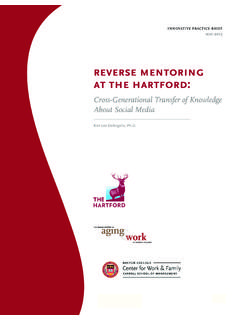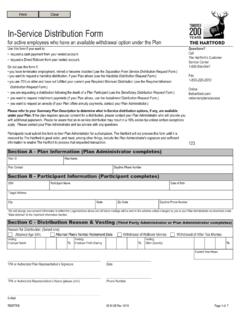Transcription of AT THE CROSSROADS - The Hartford
1 Family Conversations about Alzheimer s Disease, Dementia & DrivingAT THE CROSSROADSSafe Driving for a Lifetime The Hartford Financial Services Group, Inc., and the MIT AgeLabhave developed this guide to help people with dementia and theirfamilies prolong independence while encouraging safe driving. Theguide provides suggestions for monitoring, limiting and stoppingdriving. The information incorporates the experiences of family caregivers and people with dementia, as well as suggestions from experts in medicine, gerontology and transportation. Our children talked to him about possibly not don t know it, but he cried that night. Driving isextremely important to him. I don t want to strip himof his dignity. - Wife whose husband has mild dementia1 Today, more than 5 million people in the suffer from dementia, with Alzheimer s disease being the most common form.
2 And this number is expected to grow as the population you have a relative with dementia who s stilldriving?Do you worry about him or her driving?Or are you just hoping hisor her driving is goodenough? If you have a loved one diagnosed with dementia,you ll struggle with a number of caregiving challenges from medical and daily care to financialand legal matters. Driving, of course, can be an immediate andlife-threatening issue making it a family s difficult to decide when someone with dementia shouldstop driving, since you need to balance safety considerationswith the person s sense of independence, pride and information about dementia warns against driving, butdoesn t help you determine when it should stop.
3 My sons and daughtershad a meeting without me and decided that they want me to stop driving, but they re making a big deal out of nothing. I m very comfortable on the ve driven longer thanthey ve been alive. Person recently diagnosedwith dementiaBalancing Independenceand Safety2 The Difficulties of Dementia and DrivingWhen you drive, different regions of your brain cooperate to receivesensory data (through sight and hearing), prioritize information, recallrelated past experiences, anticipate likely scenarios, analyze options,plan ahead, use proper judgment, synchronize movement responses,and juggle more than one task at a time. And, because of the nature of driving, each of these required tasks needs to be accomplished withadequate speed.
4 Depending on the specific difficulties of the individual - and every individual with dementia may initially present with a different pattern of difficulties based on the specific areas of braindamage one or more of these functions may be impaired. It s the specific profile of these difficulties that can pose a risk for some individuals in the early stages of the early stages of dementia, many people usually are still sociallyengaged and able to manage daily activities including safe , all people with irreversible dementia will eventually becomeunsafe to drive because of the degenerative, progressive nature of thebrain disease. The question is: at what point is someone unable to continue to drive safely? That nagging question surfaces most people, driving represents freedom and control.
5 It s a way to access healthcare, to buy necessities, to be productive and to stayconnected to family, friends and the community. Giving up driving can be a deeply personal and emotional someone in your family is diagnosed with dementia, you can encour-age that person to express what the loss of driving means on a personallevel. Talking openly at this early stage can help smooth the transitionto eventually not driving. Tr y to imagine what your life would be like if you couldn t drive, and encourage the person with dementia to sharehis or her feelings. Yo u also might encourage that person to confide in a friend about what it means to give up driving. Not Like Changes Common in Later Life As we age, even those of us without dementia may experience physicalchanges that affect driving including eyesight problems and slowerreaction times.
6 In response, most people will modify the way they driveby avoiding driving on certain roads or at night. They usually can assessand regulate their driving without family intervention and can continueto drive safely throughout their lives. We know that stopping him from drivingis the first of many indignities to come. He thinks he s not much of a man without a car. It s so difficult to know where to draw the line. Daughter of a personwith dementiadriving. But it does signal the need for increased monitoring and Driving AbilitiesOnce someone has been diagnosed with dementia, it is critically important to be on the lookout forchanges in their driving skills. Family members areoften in the best position to monitor changes in driving skills such as attention span, distance per -ception or ability to quickly process information.
7 Yo u can refer to the Warning Signs for Drivers withDementiaon page 11 for a systematic, objective wayto assess driving over time. Yo u can refer to your noteson this worksheet when making driving-related deci-sions and can use them in your conversations withhealthcare providers. Yo u may also want to considergetting an independent opinion by arranging for aComprehensive Driving you don t know what to look for, you might missopportunities to notice driving behaviors when youride with your relative. As a result, you might over-look subtle changes or dismiss incidents as not beingcause for serious concern. The Warning Signslist canhelp you be more attentive to any decline in abilities. Consider the frequency and severity of minor incidents or an unusual, major incident may warrant action.
8 Look for patternsof change over or minor incidents do not warrant immediate or drastic action. Avoid an alarming k e notes and haveconversations at a later, convenient time, rather than during or immediately after an driving errors are more serious than someone gets lost while driving in a familiar area,he or she may have cognitive problems that could becaused by medication, physical illness or a disordersuch as dementia. This should be brought to theattention of a doctor it s different for those with Alzheimer s diseaseor other dementias particularly because the condi-tion can be gradual and unpredictable. Drivers withdementia often modify their driving by driving lessat night or in unfamiliar areas, but as their abilitiesdiminish, they lose the capacity to determine whenthey should stop driving.
9 They re likely to minimizethe complexity of driving and overestimate their abilities. They may lose the ability to be aware of their own neurological and thinking problems. They may make excuses or blame others for theirhigh-risk driving behaviors, and may say things like: Just because I got lost doesn t mean I can t drive. I make sure I look where I m going. I ve driven many, many years and haven t had an accident yet. As the person begins to lose driving and self-assess-ment skills, serious risks increase and caregivers must step a BalanceThe challenge with driving and dementia is to pre-serve a person s sense of independence for as long aspossible, while simultaneously protecting the safety of that person and times, caregivers will allow a person withdementia to continue driving even though theybelieve it s unsafe.
10 They might not want to hurt thatperson s feelings, or they may worry about what others might think. Some want more support fromfamily, friends or professionals before intervening, and others want to delay taking on the responsibilityof providing the other extreme, some family members overreactto common driving errors such as failure to completea stop at a stop sign. They may blame such errors onthe disease, when, in fact, the person may have alwayshad this bad driving habit. A single occurrence ofpoor driving doesn t mean the person has to stop34 Easing the Transition from Driver to PassengerYo u can help a person with dementia limit and stop driving over time while still preserving his or her dignity with a progressiveapproach and a combination of strategies that fit your family sunique situation.





